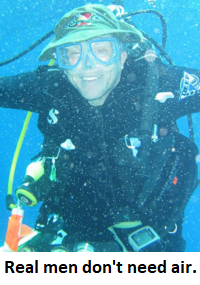real-life story of the DC cops. I’m going to keep it vague because a civil suit looks probable.
I was in Northwest last week with friends to celebrate a new job one of them had. After dinner for grins we went for a beer at a local girly bar. A buddy of mine, call him Bill, had a pocket camera and asked one of our party to take a commemorative photo of the group. She did. Employees of the bar hurried over and demanded the camera. Photography was forbidden, they said. Bill refused.
They escorted Bill away from our table. One of our group, a big-league lawyer, apparently scented trouble and followed. They didn’t return. Correctly figuring they’d been ejected, we left and found them on the sidewalk. They said the employees of the bar had physically blocked the door so that Bill couldn’t leave and made it clear that they would forcibly confiscate the camera. The lawyer advised Bill not to give it to them, but not to resist their taking it. They took it.
Bill called the cops.
A car arrived. The cop was a big easy-going black guy, the easy-going part helping a lot when dealing with angry people. He listened, seemed to figure Bill ought to get his camera back, and went into the girly bar to get it.
The first time he came back without it. The trouble was that neither he nor any of the other cops who soon showed up knew exactly what the law was. Can a girly bar forbid photography? You’d think so. On the other hand, I hadn’t seen a sign saying “No Photos.” If a customer, not knowing it’s forbidden, takes a picture, does that give the bar the right to take the camera by physical force? I don’t know. The cops seemed to think not, but weren’t sure.
More cops showed up, one being Sergeant James Brown, who looked to be a supervisor. They wanted to find a solution that would make everybody happy if possible. Otherwise they seemed to figure they’d get the facts and if Bill wanted to file criminal charges or sue, that was his choice.
No cop said this, but in these situations they have to be careful, because if they arrest somebody, as for example in this case the guys who took the camera, and it turns out to have been arguably legal, then the girly bar sues the police department. What looks like assault, battery, and robbery to one side looks to the other like protecting the girls from being photographed for unknown purposes by a stranger. And cops aren’t lawyers.
One of the newly arrived police was a guy I’d worked with before. From curiosity we walked to another girly bar close by. The sign on the door clearly said no photos. We went back to the bar in question, walked through, and didn’t see a sign forbidding photos.
Considerable discussion went on for some time between the police and the employees of the bar. I wasn’t there in an official capacity and wasn’t privy to these conversations. Eventually the cops got the camera and gave it back to Bill, intact and, as it turned out, with the pictures, which showed nothing but members of our group, undamaged. Everybody went home.
Now, lots of people hate cops. Some of the haters are friends of mine. Because I know lots of police folk and think most of them are pretty good people, I get constant guff from these guys about how terrible the police are.
For example, a friend of mine, having called the cops after a robbery of some sort, was outraged that the cop showed up eating a piece of pizza. I don’t get it. A guy grabs a bite on a busy shift, then gets a call–so he’s supposed to throw his lunch away?
One of our group told me ominously, “Now, Fred, you’re going to see things from the other side.” Well, OK. As best I can tell, the cops showed up, sorted out a complicated situation, got the camera back, and managed to be agreeable to everyone while doing it. They didn’t beat a single widow, shoot even one orphan, and weren’t surly. How well they filled out their reports I don’t know, though it may come out in court.
Bad cops are a bad problem, but there aren’t that many of them hereabouts. Most of the time, sez me, most cops do a reasonable job. Believe it or not, that usually includes the police in Washington.
